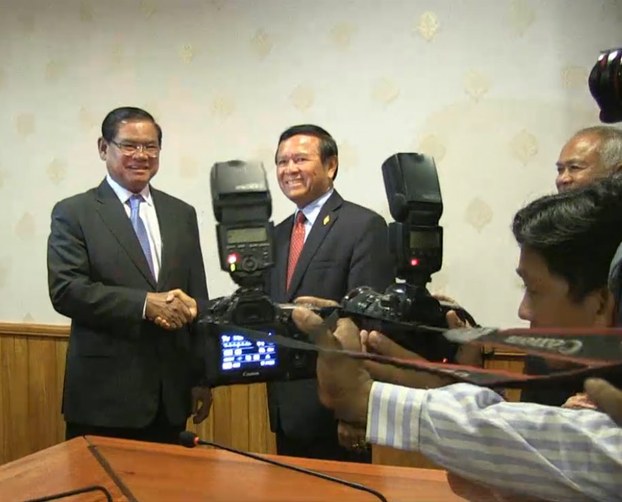




A meeting between top officials of Cambodia’s ruling Cambodian People’s Party (CPP) and the country’s political opposition failed on Monday to address the plight of more than a dozen activists jailed on what have been described as politically motivated charges, with one CPP official calling the situation a matter only for the country’s courts.
The meeting between CPP deputy president Kem Sokha and Cambodia National Rescue Party (CNRP) deputy president Sar Kheng focused instead on other concerns, including a still unsettled border dispute between Cambodia and Vietnam and a controversial law restricting the activities of nongovernmental organizations (NGOs), officials told reporters following the meeting.
The arrests of 14 CNRP activists for taking part in an anti-government rally that turned violent last year, and the issuing this month of warrants for two others, are not subjects appropriate for political dialogue, Secretary of State for the Ministry of Interior Sak Setha said.
“This is a matter for the courts,” Sak Setha said, adding, “It is within the court’s jurisdiction to arrest and prosecute those activists, using its own procedures.”
Both parties have vowed to “solve the problem” as soon as possible, though, he added.
Warrants issued
On Aug. 5, Cambodian authorities detained three CNRP activists on insurrection charges for their role in the July 15, 2014 protest, prompting one lawmaker to say the move was linked to the party’s recent criticism of the government over contentious border issues with neighboring Vietnam.
The Phnom Penh Municipal Court has now also issued warrants for two other activists who participated in the rally, which led to clashes between protesters and security forces in Phnom Penh’s Freedom Park.
In July, authorities arrested 11 other CNRP activists who took part in the rally and sent them to Cambodia’s notorious Prey Sar prison after they were convicted in municipal court on insurrection charges.
Three were handed 20-year sentences, while the rest received sentences of seven years.
'Politically motivated'
Am Sam Ath, an investigator for the domestic rights group Licadho, called the arrests politically motivated, pointing to an Aug. 3 speech by Prime Minister Hun Sen in which he called for authorities to make more such arrests.
Meanwhile, CNRP lawmaker Um Sam An told RFA’s Khmer Service in an earlier report that the arrests were related to party activists’ and parliamentarians’ recent role in disputes over alleged territorial encroachment by Vietnam. CNRP politicians have been outspokenly critical of the government’s handling of unresolved border demarcation work with Vietnam.
In a statement last week calling for the activists’ release, the CNRP called the arrests contrary to the spirit of political cooperation it had forged with the CPP on July 22, 2014, in which the opposition ended a nearly one-year boycott of parliament following a disputed election and the ruling party adopted key reforms to Cambodia’s National Election Commission.
CNRP steering committee member Eng Chhai Eang told reporters on Monday that the party will now appeal to a higher court to overturn the Phnom Penh Municipal Court's verdicts against the jailed activists.
“We will find a lawyer to help those detainees, as well as the two others that the court is looking to arrest,” he said.
Reported by Moniroth Morm for RFA’s Khmer Service. Translated by Sarada Taing. Written in English by Richard Finney.